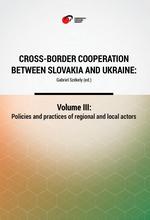THE LEGISLATIVE FRAMEWORK FOR CROSS-BORDER COOPERATION ON THE REGIONAL LEVEL
THE LEGISLATIVE FRAMEWORK FOR CROSS-BORDER COOPERATION ON THE REGIONAL LEVEL
Author(s): Vladislav Dudinský
Subject(s): International relations/trade, EU-Accession / EU-DEvelopment
Published by: Prešovská univerzita v Prešove, Filozofická fakulta, Inštitút politológie
Keywords: Cross-border cooperation on the regional level; EU; Slovakia;
Summary/Abstract: Cross-border cooperation on the regional level is legitimized and made possible mainly by the laws of the state. First and foremost is the Constitution of the Slovak Republic (Act No. 460/1992 Coll.), which by the amendment of the Constitutional Act No. 90 from 2001 equalized the standing of a higher territorial unit with that of a municipality (Art. 64 of the Constitution) and, in amended form, ensured adequate constitutional rights for a higher territorial unit and its authorities. Elaboration of the competences of higher territorial units is addressed by the Act on Self-Government of Higher Territorial Units No. 302/2001 (the Act on Self-Governing Regions), which states, among other things, in § 5 (International cooperation), par. 1 that “A self-governing region may within the range of its competences cooperate with territorial and administrative units or with the officials of other states performing regional functions. It has the right to become a member of an international association of territorial units or territorial authorities” (Zakon o samosprave 2001).
- Page Range: 9-17
- Page Count: 9
- Publication Year: 2019
- Language: English
- Content File-PDF

